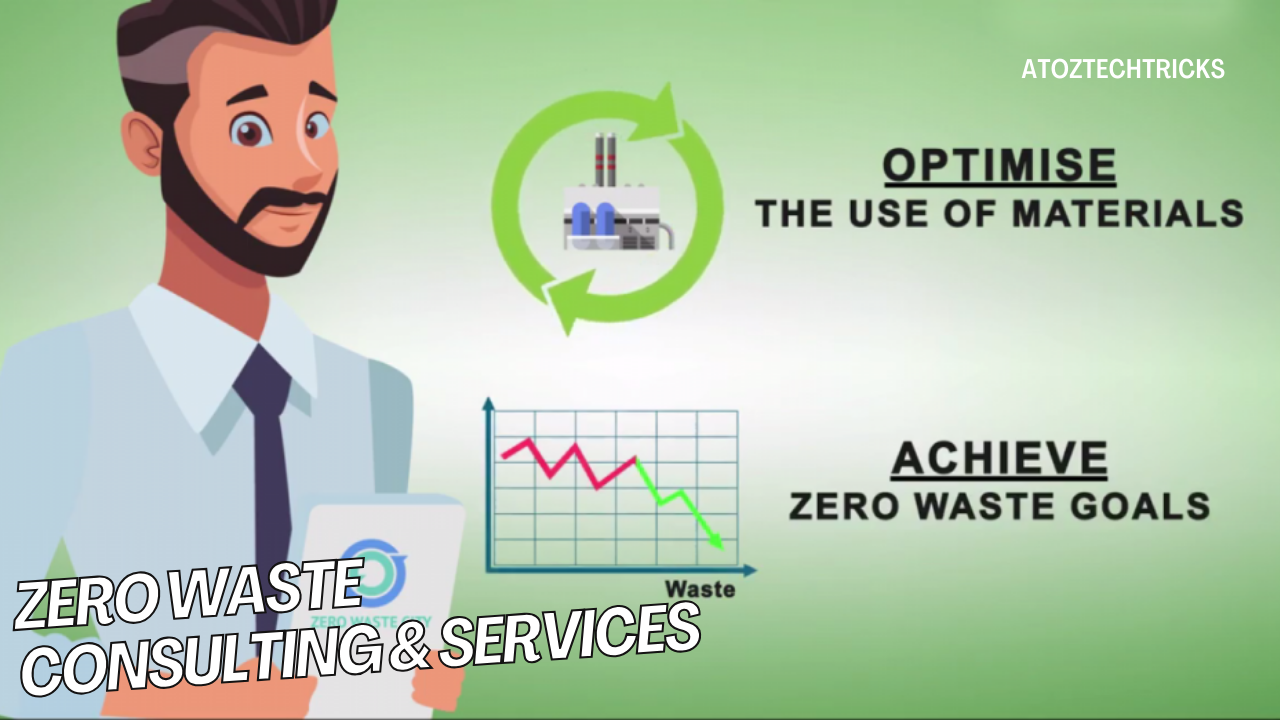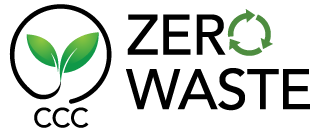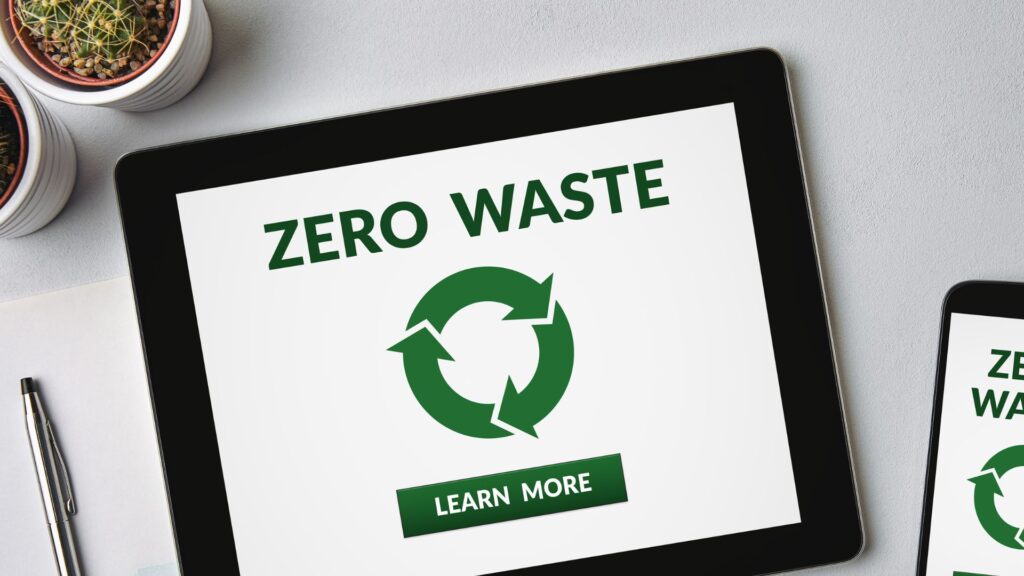Zero Waste Consulting and Services: A Comprehensive Guide

The concept of “zero waste” has gained significant traction in recent years as individuals, businesses, and governments recognize the urgent need to address the growing environmental challenges. Zero waste consulting and services play a crucial role in helping organizations transition towards sustainable practices by minimizing waste and maximizing resource efficiency. In this comprehensive guide, we will explore what zero-waste consulting and services entail, the benefits they offer, and how businesses and communities can implement zero-waste strategies.
What is Zero Waste?
Zero waste is a philosophy and a set of practices that aim to reduce the amount of waste generated and sent to landfills or incinerators. The goal is to create a closed-loop system where all materials are reused, recycled, or composted, and nothing is discarded as waste. The zero waste approach challenges the traditional linear model of consumption, which follows a “take, make, dispose” pattern, and instead promotes a circular economy where resources are continuously cycled back into the system.
The Role of Zero Waste Consulting
Zero waste consulting involves working with businesses, organizations, and communities to develop and implement strategies that reduce waste and promote sustainability. Zero waste consultants are experts in waste management, resource efficiency, and sustainable practices. They provide guidance and support to help clients achieve their zero-waste goals by analyzing current waste streams, identifying opportunities for improvement, and developing customized solutions.

Key Services Offered by Zero Waste Consultants
Zero waste consultants offer a wide range of services to help organizations minimize waste and improve sustainability. Some of the key services include:
1. Waste Audits
A waste audit is a comprehensive analysis of an organization’s waste streams. Zero waste consultants conduct waste audits to identify the types and quantities of waste generated, as well as the sources of waste. The audit helps to determine the effectiveness of current waste management practices and identifies areas where waste can be reduced or diverted.
2. Waste Reduction Strategies
Based on the findings of the waste audit, zero waste consultants develop waste reduction strategies tailored to the client’s specific needs. These strategies may include changes in procurement practices, process optimization, employee training, and the implementation of recycling and composting programs.
3. Resource Efficiency and Process Optimization
Zero waste consultants work with organizations to improve resource efficiency by optimizing processes and reducing the consumption of materials, energy, and water. This may involve redesigning products, improving manufacturing processes, or implementing lean manufacturing techniques to minimize waste.
4. Employee Training and Engagement
Successful zero-waste initiatives require the involvement and commitment of all employees. Zero waste consultants provide training and education programs to raise awareness about waste reduction and sustainability. They also help to engage employees in zero-waste practices by creating a culture of sustainability within the organization.
5. Recycling and Composting Programs
Zero waste consultants assist organizations in setting up and managing recycling and composting programs. This includes identifying suitable recycling partners, establishing collection and sorting systems, and ensuring compliance with local regulations.
6. Zero Waste Certification
Many organizations seek certification to demonstrate their commitment to zero-waste principles. Zero waste consultants guide clients through the certification process, helping them to meet the requirements and achieve certification from recognized bodies such as the Zero Waste International Alliance (ZWIA) or TRUE (Total Resource Use and Efficiency).
7. Policy and Regulatory Compliance
Zero waste consultants help organizations navigate the complex landscape of environmental regulations and policies. They ensure that clients comply with local, state, and federal regulations related to waste management and sustainability, and assist in the development of internal policies to support zero-waste goals.
Eco-Friendly Product Development: A Sustainable Path to Innovation
Benefits of Zero Waste Consulting and Services
Implementing zero-waste practices offers numerous benefits for businesses, organizations, and communities. Some of the key benefits include:
1. Cost Savings
Reducing waste can lead to significant cost savings for organizations. By minimizing the amount of waste sent to landfills, businesses can reduce disposal costs and, in some cases, generate revenue from the sale of recyclable materials. Additionally, improving resource efficiency can lower operating costs by reducing the consumption of raw materials, energy, and water.
2. Environmental Impact
Zero waste practices have a positive impact on the environment by reducing the amount of waste sent to landfills and incinerators, conserving natural resources, and lowering greenhouse gas emissions. By adopting zero-waste strategies, organizations can contribute to a more sustainable future and reduce their environmental footprint.
3. Enhanced Reputation and Brand Image
Consumers are increasingly concerned about the environmental impact of the products and services they purchase. Organizations that adopt zero-waste practices can enhance their reputation and brand image by demonstrating their commitment to sustainability. This can lead to increased customer loyalty, attracting environmentally conscious consumers, and differentiating the organization from its competitors.
4. Regulatory Compliance
As governments around the world introduce stricter regulations related to waste management and sustainability, organizations need to ensure compliance to avoid fines and penalties. Zero waste consultants help organizations stay ahead of regulatory changes and ensure that they meet all legal requirements.
5. Employee Engagement and Satisfaction
Employees are more likely to be engaged and satisfied when they work for an organization that prioritizes sustainability and environmental responsibility. Implementing zero-waste practices can create a positive work environment and foster a sense of pride and ownership among employees.
Implementing Zero Waste Strategies in Businesses
Implementing zero-waste strategies requires a comprehensive and systematic approach. The following steps outline how businesses can work with zero-waste consultants to achieve their sustainability goals:
1. Conduct a Waste Audit
The first step in implementing zero waste strategies is to conduct a waste audit. A waste audit provides a detailed analysis of the types and quantities of waste generated, as well as the sources of waste. This information is critical for identifying opportunities for waste reduction and developing targeted strategies.
2. Set Zero Waste Goals
Based on the findings of the waste audit, organizations should set specific, measurable, achievable, relevant, and time-bound (SMART) zero-waste goals. These goals should be aligned with the organization’s overall sustainability objectives and should be communicated clearly to all stakeholders.
3. Develop a Zero Waste Action Plan
Once zero-waste goals have been established, the next step is to develop a zero-waste action plan. This plan should outline the strategies and initiatives that will be implemented to achieve the goals, including waste reduction, recycling, composting, and process optimization. The action plan should also include timelines, responsibilities, and metrics for tracking progress.
4. Engage Employees and Stakeholders
Employee engagement is critical to the success of zero-waste initiatives. Organizations should involve employees in the development and implementation of zero-waste strategies by providing training, education, and opportunities for input and feedback. It is also important to engage other stakeholders, such as suppliers, customers, and community members, to ensure their support and participation.
5. Implement Waste Reduction and Resource Efficiency Measures
Implementing waste reduction and resource efficiency measures is the core of zero-waste strategies. This may involve redesigning products and processes, improving procurement practices, and optimizing resource use. Organizations should also establish recycling and composting programs to divert waste from landfills and ensure that materials are recycled or composted.
6. Monitor and Evaluate Progress
Regular monitoring and evaluation are essential to ensure that zero waste strategies are effective and that progress is being made towards achieving the goals. Organizations should track key metrics, such as waste generation, diversion rates, and resource consumption, and make adjustments to the action plan as needed.
7. Celebrate Successes and Continuously Improve
Celebrating successes and recognizing the achievements of employees and stakeholders is important for maintaining momentum and motivation. Organizations should also continuously seek opportunities for improvement and innovation in their zero-waste practices.

Zero Waste in Communities
Zero waste is not just for businesses and organizations; communities can also benefit from adopting zero waste principles. Zero-waste communities aim to reduce waste generation, increase recycling and composting, and promote sustainable practices among residents, businesses, and local governments.
1. Community Waste Audits
Similar to businesses, communities can conduct waste audits to assess the types and quantities of waste generated by residents, businesses, and institutions. This information is used to develop targeted waste reduction strategies and programs.
2. Public Education and Outreach
Public education and outreach are essential components of zero-waste communities. Local governments, non-profits, and community organizations can work together to raise awareness about waste reduction and recycling, provide education on sustainable practices, and engage residents in zero-waste initiatives.
3. Policy and Regulatory Support
Local governments play a key role in supporting zero-waste communities by implementing policies and regulations that promote waste reduction, recycling, and composting. This may include banning single-use plastics, implementing pay-as-you-throw programs, and providing incentives for businesses and residents to adopt zero-waste practices.
4. Infrastructure and Services
Communities need the right infrastructure and services to support zero waste goals. This includes providing convenient access to recycling and composting facilities, establishing drop-off centres for hard-to-recycle items, and offering curbside collection services for recyclables and compostables.
5. Community Partnerships and Collaboration
Collaboration among community members, businesses, non-profits, and local governments is essential for achieving zero waste goals. Partnerships can help to leverage resources, share knowledge and best practices, and create a unified approach to waste reduction.
Sustainability-Focused Business Ideas: Innovating for a Greener Future
The Future of Zero Waste Consulting and Services
As the demand for sustainable practices continues to grow, the role of zero-waste consulting and services will become increasingly important. The future of zero-waste consulting will likely see advancements in technology, such as the use of data analytics and artificial intelligence to optimize waste management practices. Additionally, there will be a greater focus on circular economy principles, where materials are continuously cycled back into the system, and waste is designed out of the process.
Zero waste consultants will also play a critical role in helping organizations navigate the evolving regulatory landscape and meet the increasing expectations of consumers and stakeholders. As more businesses and communities adopt zero-waste practices, the need for expert guidance and support will continue to grow.

Zero waste consulting and services are essential for helping organizations and communities transition towards sustainable practices and achieve their zero waste goals. By conducting waste audits, developing waste reduction strategies, and implementing resource efficiency measures, zero waste consultants play a crucial role in minimizing waste, conserving resources, and reducing environmental impact. The benefits of zero waste practices are far-reaching, including cost savings, environmental protection, enhanced reputation, and regulatory compliance. As the demand for sustainability continues to grow, zero waste zero-waste and services will remain a vital component of the global effort to create a more sustainable future.



Post Comment